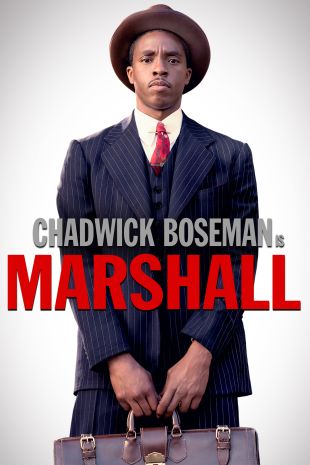
This biopic chronicles one of the defining cases in the early career of Thurgood Marshall, the first African-American Supreme Court justice. The plot centers on Marshall (Chadwick Boseman) and Sam Friedman (Josh Gad), the latter a young Jewish lawyer who is handling criminal defense for the first time after previously specializing in low-profile insurance claims. Together, they boldly defend a black chauffeur named Joseph Spell (Sterling K. Brown), who is accused of the rape and attempted murder of his white employer, Eleanor Strubing (Kate Hudson). The duo fight for justice while facing numerous obstacles, the most obvious of which is the racial prejudice that permeates the conservative town of Greenwich, CT, in the 1940s.
When a biased judge prevents Marshall from playing an active role in defending Spell, Friedman is forced to take the lead in a trial he wanted nothing to do with initially. The film slowly develops this theme of preferring complacence vs. risking one's reputation, as Marshall carries out his duty through the voice of a timid and inexperienced lawyer whose conviction grows with each successive hearing. Friedman's captivating (if occasionally clumsy) performances, backed by Marshall's unyielding confidence, gradually expose the intolerance of their adversaries, until the inherent bigotry of the legal system becomes glaringly obvious as the final verdict is presented.
While the shadow of racism bestows an ominous air to the story from its opening scene, the film as a whole is proportionately focused on prejudice of all kinds, including sexism and anti-Semitism. The two most pivotal breakthroughs in the argument for Spell's defense come from what could be seen as unlikely sources -- conversations between Marshall and women who are uninvolved with the legal proceedings. In this way, the film portrays ideas of truth and justice as aspects of the human condition that manifest themselves in personal relationships, rather than in the abstract rulings of a courtroom. The inner conflicts and societal pressures shared by all individuals become consistent factors in determining moral capacity, and we understand that telling a lie out of fear and self-preservation is a forgivable offense compared to sacrificing an innocent man's freedom in order to save another person's seemingly upstanding reputation.
Although some aspects of the film may come off as formulaic and expected, such as the dramatic heroism pervading Marshall's character and his mission, this is not unwarranted considering the historical context. If there is an issue with his embellished theatrics and ardent personality traits, it is due to the lack of a proper introduction to Thurgood Marshall and his status as a legend and a trailblazer in the U.S. legal system. And if the racially charged narrative feels outdated, one has only to look at the current sociopolitical climate to realize that maybe now is the perfect time for a true story that seeks to address the toxic ideologies that are still very much present at every level of American culture. If nothing else, Marshall serves as a reminder that even victories you don't get to celebrate are still worth fighting for.
